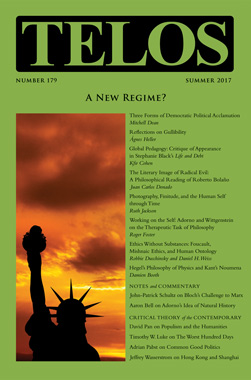By Jack Robert Edmunds-Coopey · Wednesday, October 3, 2018 As an occasional feature on TELOSscope, we highlight a past Telos article whose critical insights continue to illuminate our thinking and challenge our assumptions. Today, Jack Robert Edmunds-Coopey looks at Damien Booth’s “Hegel’s Philosophy of Physics and Kant’s Noumena” from Telos 179 (Summer 2017).
Damien Booth’s article “Hegel’s Philosophy of Physics and Kant’s Noumena” addresses Hegel’s critique of Kant concerning the positing of the noumena, the realm beyond the sensible, which for Hegel results in entanglements and contradiction, Kantian antinomies that the dialectic could resolve. While the article appears to be an exposition of the contradiction of Kant’s noumena and its critique in Hegel, Booth turns to Adorno and Heidegger to accentuate the relevance of Kant’s modern project of philosophy and Hegel’s critique.
Continue reading →
By Mitchell Dean · Wednesday, July 12, 2017 This paper takes its initial inspiration from Carl Schmitt’s claim in 1927 that the “original democratic phenomenon . . . is acclamation,” and draws upon the interchange between religious and political forms of acclamation observed by Ernst Hartwig Kantorowicz and Erik Peterson and elaborated recently by Giorgio Agamben. If Schmitt is correct, then acclamation is central to the construction of “the people” who by definition are the source of political legitimacy. What is required then is what I have called an “analytics of publicity” that would study the different ways in which the public is formed through different forms of acclamation.
Continue reading →
By Russell A. Berman · Monday, June 12, 2017 Telos 179 (Summer 2017) is now available for purchase in our store.
 When the historian Ken Burns spoke at the Stanford University commencement last June, he delivered an exceptionally political address, including an attack on what he labeled the “Vichy Republicans.” Those Republican leaders who had not distanced themselves from candidate Trump, so Burns, were the equivalent of the Vichy French who collaborated with Hitler. That master metaphor, comparing 2016 to 1933, has continued into the new administration, with the anti-Trump camp labeling itself as “the resistance.” Despite Burns’s historiographical authority, one might question the validity of the underlying equation. No doubt the policies of the Trump administration are more conservative than those of Obama—hardly surprising—but the paradigms of the totalitarianism of the twentieth century are not necessarily the most adequate theoretical tools to analyze early twenty-first-century political phenomena. As emotionally satisfying as it may be for some to try to relive battles of earlier decades, Critical Theory ought to try to do better. We may very well be entering a different political era, a new regime, and not only in the United States. Can we describe it more effectively? When the historian Ken Burns spoke at the Stanford University commencement last June, he delivered an exceptionally political address, including an attack on what he labeled the “Vichy Republicans.” Those Republican leaders who had not distanced themselves from candidate Trump, so Burns, were the equivalent of the Vichy French who collaborated with Hitler. That master metaphor, comparing 2016 to 1933, has continued into the new administration, with the anti-Trump camp labeling itself as “the resistance.” Despite Burns’s historiographical authority, one might question the validity of the underlying equation. No doubt the policies of the Trump administration are more conservative than those of Obama—hardly surprising—but the paradigms of the totalitarianism of the twentieth century are not necessarily the most adequate theoretical tools to analyze early twenty-first-century political phenomena. As emotionally satisfying as it may be for some to try to relive battles of earlier decades, Critical Theory ought to try to do better. We may very well be entering a different political era, a new regime, and not only in the United States. Can we describe it more effectively?
Continue reading →
|
|



